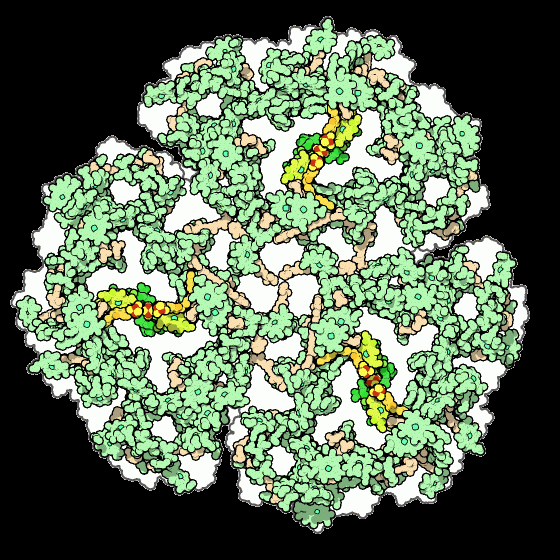I could be reading it wrong. The government invested 100m+ yuan into the company CellX last year so I wouldnt be surprised if it were subsidized. I can't find any up to date information of other types of cultured meat, seems pork is the cash cow right now. Comments on similar articles says the meat is only available in restaurants right now.
:some-controversy:
Guess it depends on how orthodox they are. Its grown in a sterile environment so itd be more contagion free than any kind of regular meat
I don't think they object pork as a concept, just that it's somehow the most unclean animal you can eat
You can get a lot more parasites from eating pork than just about anything else, trichinosis in particular
there are very few cases of that, at least in the US.
iirc that there hasn't been a case of it in humans from farmed pork in years (or wasn't for years, maybe trump made the FDA worse)
Oh yeah, I mean it was a bigger deal back when all these religious guidelines were being written for sure — just that it makes sense to single pork out as being "unclean" or whatever back in the day
Trichinosis was eliminated from the US pig population back in the 1970s. Eat all the blue pork chops you want.
just that it’s somehow the most unclean animal you can eat
pigs are pretty unhygenic tbf
Yeah sadly a lot of it is just us putting them in terrible conditions
Or if the tusks are longer than some tresholdchews cud. like those pigs in ondonesia that count as deer.There are sseveral hypotessis on why pork is banned.
One is that as iraq began turning into a dessert it became economically unviable and enviormentally destructive. So you begin seeing less pig remains starting from around the year 2000. This would have eventually lead to a ban on pigs specifically posibly identified by hoof shape.
Then there is the disease argument. The more your foods physioligy resembles yours the easier for its parasites will grow on you. And the more varied your diet the more types of parasotes you come in contact with. Eating omnivores or animals high in the food chain is a bad idea. But an animal that chews cud is going to be relativley safe. So this is actually a good rule of thumb about what to eat if you ever fond yourself in a place with unkown fauna.
The opsite is true for the prohibitions on alcohol. If you find yourself in a place of doubtful higyne fermented or boiled stuf is best. Microorganisms that live in alcohol or vinager are not harmful to us.
I've been looking into it more and the most common form for lab grown is pork belly. Pig skin is also common and probably even more likely to be a hit than pork belly, afaik they use it for noodles
Here's some info on it from June last year. The tech is advancing fast. Includes some pics of food made from it. They had enough food on hand to feed a pretty big conference. Lab grown salmon is also looking promising and I am very much looking forward to that because I love salmon
In general I am very interested in this industry from a scientific point of view. If they can hit mass scale operations with this tech, it will directly feed into tech for generating human organs for transplant at scale
Also if China can industrialize lab-grown proteins it could more easily prevent itself from being choked off by Western sanctions/blockade.
So it turns out lab-grown meat is in fact possible and it was just idiotic western techbros who couldn't do it
The lack of big dipshit ranchers seeking trade protectionism probably also helps
I don’t think anyone is saying the western techbro idiots couldn’t do it - and a lot of them weren’t trying. Alt protein in the US is pretty different. But the FDA/USDA rules are really restrictive/slow for approval, the rancher lobbies you mentioned are strong, and there’s just not a command economy like in China so it’s much more difficult to gain momentum on a market basis.
That said yeah, I feel like the pork produced for $3 is either super subsidized or would never be able to get approval in the US food safety-wise, and I’m not confident that would be a bad thing knowing what would need to go into it. For instance, if the growth media has antibiotics in it, you’d basically be microdosing penecilin in every bite.
Afaik they avoid needing antibiotics by making the cells in a high pressure warm tank. But I haven't been keeping up on advancements
Edit: Yeah found articles confirming no medications used at all in Chinese meat labs, which is honestly just a great selling point on top of the carbon effeciency
The US already bans Chinese beef import
Probably protectionism for the US industry/lobbies.
In fact, the only 3 meat products that can be imported into the US from China is raw catfish, processed chicken and processed duck as per https://www.fsis.usda.gov/inspection/import-export/import-export-library/china
I remember an article about a startup who spent a decade trying, and then abandoned the concept because they couldn't solve the "taste and texture of a tumor" problem
That’s no longer an issue, by a long shot. The advances made by companies across the world have really solved that, with the major hurdle the the US and Europe being regulatory approval. This isn’t a technical issue anymore so much as scaling and policy.
Honestly if the US werent handing out $38B annually to livestock, there’d also likely be parity in the market for cultured meat. Upside Foods says their antibiotic-free chicken is about $7/lb now to make, though they can’t sell it yet because USDA is dragging their feet on regulation. $7 is still a lot, but not far off what antibiotic-free chicken would cost without the subsidies.
Hey at least Upside Foods got pre market approval back in November. But yeah China is already subsidizing the industry and Xi has even talked about it whereas here its mostly radio silence.
Yes - no questions approval from FDA, huge deal. But you need both USDA and FDA to sign off, 🙄
This entire thing reads like it's written by a poorly trained AI or some kind of robot that crawls around social media copying posts based on keywords.
On the bottom it says some other pork (not lab grown) is ¥18/斤(500g) which makes no sense.
It def is an aggregator. There were a number of articles but this one summarized most of the things I found on baidu. Also, real talk, Chinese search engines don't feel as good as Western or even Russian/Czech ones. Very cumbersome to find things and throws out a lot of trash articles. And things like Google are not good at finding Chinese sources either.
That is the general cost of pork, though. SCMP reported in 2019 that it is about a dozen yuan per 500g, but it rose to 30 yuan later. It seems pork in general is very volatile in price in China and that might be why they're looking to lab meat.
I would like to note that this price isn't particularly absurd, prices are getting cheaper across the board. Right now it seems a matter of distribution and getting funding to produce at scale because the tech that has made this available has only recently released.
Why doesn't China have cheese caves and prosciutt caves? Every few years it seems like a glut in the market causes farmers to dump milk or kill livestock.
A lot of markets are like this. Its a universal issue with capitalism and particularly with consumable goods. If the agriculture industry was entirely owned by the state, that would be possible. But small scale farmers do not have the ability to start up a cheese operation off the cuff, so they pour out excess milk so spoilage doesn't spread.
You'll note that there is a trend towards monopolies in capitalism. Monopolies do have some flexibility when it comes to perishable goods like this, like redirecting things to canning, because they own the farm and the factories. But sometimes even then, a monopoly isn't big enough to reduce wastage. Thats where socialism is necessary in order to reduce wastage. But you can't just hit the socialism button, its far more complex than that.
One benefit of lab grown meat is that it can be confined to a small area, which makes centralization even easier and reduce wastage and increase recycling. I do strongly believe these sorts of technologies that downsize old high land use structures are the most necessary for socialist development.
Not quite unfortunately, a small amount of animals do have to suffer (though possibly not fatally) for the original stock due to things like cell replication limits, which are hard to turn off while maintaining tissue structure.
It's many orders of magnitude better, though. Omelas Burger.
This claim is very much at odds with the information presented in this article, which I seem to recall finding here on this very website.
A lot of these figures are outdated. That article is from 2 years ago. Since this is an emerging field, not unlike how computers used to be 50k and the size of a room but now you can go buy a raspberry pi for 30 bucks and it will fit in your pocket, the prices are rapidly changing. Even in America the price for things has gone down to 10-20 dollars for a pound of chicken, but due to a lack of support from the government it isn't getting on par with traditional meat. I think its silly and reductive to act like progress in this field is impossible when the metrics show a reduction in price and a standardization of equipment year over year.
I'd also like to point out many of these pricings are without subsidies that the agriculture industry usually gets, too.
This article honestly just feels very contrarian. It even rags on plant-based meats and gives a tone that is pro-vegan. How can you possibly be against more vegan substitutes that will increase the number of flavors available to people as a vegan?
Sure, but the competition is slaughterhouses, like the one I once visited that kills 10,000 pigs a day (and that's not even a very big one). You're talking about truly massive bioreactors that have to be kept squeaky clean to a degree that basically no one is capable of doing. The article doesn't rest on a few numbers but on the argument that it's not really possible to run one of those in a way that reaches a competitive cost.
....yeah? We have massive bioreactors now that are used to produce insulin, yeast (used for food), all sorts of things. We produce a lot of pills and medications via this method. And they have to be sterile. The average American takes something like 2-4 pills a day. That is somewhere around .5-1.2 billion pills for each day produced via this method. Science is a gargantuan undertaking but I feel like you are underestimating what we're capable of in order to be contrarian.
It doesn't appear that you read the article I posted. So here's a quote:
In one key way, though, the report’s authors appear to admit defeat: If the goal is to create a new generation of wildly profitable cultured meat companies, the economics of building full-scale facilities may never pan out.
“The requirements for return on investment need to be set much lower than common practice in commercially motivated investments,” the authors write. In other words, the entities investing in this nascent industry’s growth should have very modest expectations about profit.
Paying off a $450 million facility in an investor-friendly term of four years, GFI’s analysts found, would mean adding $11.25 per kilogram to the cost of cultured meat. But at a repayment term of 30 years, the proposed facility could reduce its capital expenditure cost to about $1.50 per kilo of meat produced—more than a seven-fold reduction, and one that is essential if price parity is ever going to be realized.
The problem is that traditional investors are unlikely to relax their repayment terms so dramatically: They’re in it for the money. The GFI report points out that investors concerned with social causes might be more patient; others, aware of potentially huge payouts down the road, may prove to be more flexible. If investor altruism proves to be in short supply, GFI makes clear that the remaining option is for “government bodies” and “non-profit funders” to shoulder the burden. This can be read as a concession: Cultured meat may never reach price parity on its own terms. It will likely need public or philanthropic support to be competitive.
To be fair, the traditional meat industry already benefits from enormous direct and indirect government subsidies. Still, critics say that GFI may still be significantly underestimating the cost of building and outfitting large-scale cultured meat facilities. Depending on who you listen to, the end result may be a bill that no reasonable investor is willing to foot.
Think of it this way: At a projected $450 million, GFI’s hypothetical facility doesn’t come cheap. But that target is only a rough estimate, and one that would quickly become unrealistic if pharmaceutical-grade practices are used. The GFI report gets around this by assuming that future cultured meat plants will be able to be built to cheaper specifications.
“A key difference in the CE Delft study is that everything was assumed to be food-grade,” Swartz said. That distinction, of whether facilities will be able to operate at food- or pharma-grade specs, will perhaps more than anything determine the future viability of cultivated meat.
The Open Philanthropy report assumes the opposite: that cultivated meat production will need to take place in aseptic “clean rooms” where virtually no contamination exists. For his cost accounting, Humbird projected the need for a Class 8 clean room—an enclosed space where piped-in, purified oxygen blows away threatening particles as masked, hooded workers come in and out, likely through an airlock or sterile gowning room. To meet international standards for airborne particulate matter, the air inside would be replaced at a rate of 10 to 25 times an hour, compared to 2 to 4 times in a conventional building. The area where the cell lines are maintained and seeded would need a Class 6 clean room, an even more intensive specification that runs with an air replacement rate of 90 to 180 times per hour.
The simple reason: In cell culture, sterility is paramount. Animal cells “grow so slowly that if we get any bacteria in a culture—well, then we’ve just got a bacteria culture,” Humbird said. “Bacteria grow every 20 minutes, and the animal cells are stuck at 24 hours. You’re going to crush the culture in hours with a contamination event.”
Viruses also present a unique problem. Because cultured animal cells are alive, they can get infected just the way living animals can.
“There are documented cases of, basically, operators getting the culture sick,” Humbird said. “Not even because the operator themselves had a cold. But there was a virus particle on a glove. Or not cleaned out of a line. The culture has no immune system. If there’s virus particles in there that can infect the cells, they will. And generally, the cells just die, and then there’s no product anymore. You just dump it.”
If even a single speck of bacteria can spoil batches and halt production, clean rooms may turn out to be a basic, necessary precondition. It may not matter if governments end up allowing cultured meat facilities to produce at food-grade specs, critics say—cells are so intensely vulnerable that they’ll likely need protection to survive.
“We’re saying, guys, it has to be pharmaceutical-grade because the process is going to demand it,” Wood told me. “It’s not whether someone will allow you [to run at food-grade specs.] It’s just the fact you can’t physically do it.”
Of course, companies could try. But that might be a risky strategy, said Neil Renninger, a chemical engineer who has spent a lot of time around the kind of equipment required for cell culture. Today, he is on the board of Ripple Foods, a dairy alternatives company that he co-founded. Before that, for years, he ran Amyris, a biotechnology company that uses fermentation to produce rare molecules like squalene—an ingredient used in a range of products from cosmetics to cancer therapeutics, but is traditionally sourced unsustainably from shark liver oil.
“Contamination was an issue” at Amyris, he said. “You’re getting down to the level of making sure that individual welds are perfect. Poor welds create little pits in the piping, and bacteria can hide out in those pits, and absolutely ruin fermentation runs.”
If it’s not clear where the breach is, things can get worse quickly. Renninger said biotech companies sometimes need to take an entire plant apart, scrub everything, and put it all back together again to mitigate an issue—a process that can be necessitated by one tiny eddy in a single piece of pipe welding, which can be “incredibly costly” in terms of labor and lost productivity.
Its a long ass article, to be fair, but I did see it a long time ago when it was first posted.
I'd like to make a point that the website is funded by a (likely) billionaire finance ghoul named Donald SUSSMAN (I can't fucking make this up) who got his fortune by speculating on Cuban agricultural prices during the revolution.
The site itself for the article is defunct and the author cannot update the article anymore for new data. Whether or not a batch fails or not is irrelevant, pigs and crops die all the time, it matters what the rate of failure is. I also find it amusing that profit is a central notion to this excerpt, outside of us being socialists. Agriculture isn't exactly profitable, it is heavily subsidized and would have brutal shocks, shortages, and deficits otherwise. But we need it to survive, so... :shrug-outta-hecks:
If you listen to some interviews with the author and his source, the source actually talks a lot about how the fracturing of the industry into a lot of companies with low IP sharing plus a poor regulatory environment is hindering development. Thats less of an issue in China due to how IP and regulation is there. The reporter gives a kinda liberal spiel about how the industry hasn't matured and doesn't deserve government funding, when in reality R&D is one of the most important things the government does. They both frame the idea in terms of profit but again, that completely misses the point. Agriculture isn't profitable.
https://www.youtube.com/watch?v=l-yZpFvzvAc This was nearly a year ago but its more of an update
Yeah I saw that page. In fairness the Cuban agriculture thing was how he got his very first success, making a few grand or something on $300; he wasn't exactly a baron of industry at the time. I didn't check into the guy's current assets, as he's a hedge fund guy now (so it could be almost anything, really). But yeah, the source is potentially suspect, to be sure.
That said, I am not going to watch a 1 hour video on this subject. If there's a text source I can read, I will look at that, but I frankly fucking hate video sources of information (this is just a weird curmudgeonly quirk of mine; nothing to do with you or this discussion). If there is a section of the video specifically relevant to the issue of bioreactor sterility, I'll watch up to say 10 or 15 minutes of it (but I won't like it lol).
And yeah, agriculture gets subsidies and is cut breaks and whatnot, but it can't realistically be subsidized to the tune of several hundred percent of the cost of the product, even in a socialist system, so major production issues are a real concern, which is the whole point I've been driving at. If we need to replace animal-produced meat in the diets of ordinary people, it needs to be cost-effective, which means lab-grown meat has to compete with plant-based alternatives as well. (The goal here, after all, is to get to a point where animal-produced meat can be banned without massively negative social and political effects.)
Believe me, though, if the issues identified can be addressed, I'll be more excited about it than basically anyone else, seeing as there are a lot of really cool biological systems that could be put to work in massive, cheaply sterile bioreactors, and to do much more interesting stuff than growing meat.
It definitely isn't several hundred percent? Its estimated that a pound of hamburger meat is 30 USD without subsidies. Its about 5.19 right now near me. So the subsidy removes about 75% of the cost. If subsidies and regulations for cultured meat were in line with agriculture, cultured meat would be somewhat competitive, and that is what we are starting to see in China.
Sure, but the competition is slaughterhouses, like the one I once visited that kills 10,000 pigs a day
this is true but there is also the labor and costs that go into rearing the pig, growing the food to feed the pig, all the logistics involved
much of which in America is heavily subsidised
I've always seen lab grown meat as like the electric car of food. Not really that much better and doesn't address the main issue of sustainability. In the same way electric cars don't fix the problem of no public transit, poorly designed cities, or everyone getting their own death machine. Lab meat for the longest time seemed to me like it'd take a lot of water and space, doesn't change the fact that people in the west eat meat with every meal, and wasn't reasonable at scale. But if it's at least become more viable I'd be pleasantly surprised.
It really just depends what they're feeding the cells. Not many people are interested in eating a lot of buckwheat and sorghum despite their nutritional value. But plenty will eat meat. Thats the benefit, you can feed the cells very cheap, hopefully space efficient crops. Crops that taste like ass to humans. You can cycle those crops out to avoid soil depletion and monocultures too, which you can't do with something people like to eat like potatoes or carrots as easily.
I wouldn't say its a very good comparison to compare them with cars.











